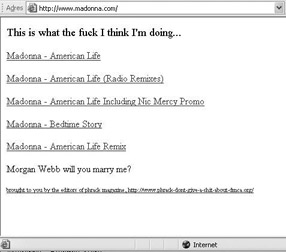SABOTAGING FILES WITH CUCKOO EGGS
|
| < Day Day Up > |
|
Another controversial way that the recording industry has fought back against file sharing is to infiltrate the various file sharing networks themselves and plant bogus files, known as cuckoo eggs. (Cuckoo birds will lay an egg in another bird’s nest, which tricks the other bird into thinking the cuckoo’s egg is actually one of its own. Cuckoo eggs in a file sharing network are similarly deceptive because they trick people into thinking that a bogus file is actually a valid one.)
Typically a cuckoo egg is labeled with the name of a popular artist’s song, and it even may have the right file size and track length. But when someone plays a cuckoo egg file, they’ll hear a few seconds of the actual song followed by cuckoo clock noises and voice messages such as, “Congratulations, you must’ve goofed up somewhere.” To deter piracy of her music, Madonna once released a cuckoo egg of her “American Life” single that contained the message, “What the fuck do you think you’re doing?” By tricking people into wasting time downloading cuckoo eggs instead of actual pirated files, the recording industry hopes to discourage people from using file sharing networks.
The planting of cuckoo eggs initially began with individual musicians who tired of seeing their music appear on file sharing networks, but cuckoo eggs are now big business in the recording industry itself. Many record labels have hired the services of companies such as Overpeer (http://www.overpeer.com), Covenant (http://www.covenant-corporation.com), and MediaDefender (http://www.mediadefender.com). These companies essentially take popular copyrighted files, such as the latest hit singles, and convert them into cuckoo eggs, which they spread throughout the popular file sharing networks.
“What we do is make peer-to-peer a lot less fun and help users do the right thing,” said Marc Morgenstern, CEO of Overpeer, a company with patents on altering the sound quality of a music file by dubbing in distorted sounds or voices. Based on a client’s wishes, Overpeer can release thousands of cuckoo eggs that simply mimic pirated files or contain links to authorized music downloading sites.
Ironically, cuckoo eggs are not free from legal controversy. Because many cuckoo egg files contain part of the original song, trading cuckoo eggs can also violate copyrights. Even more surprising is that many of the file sharing companies have threatened to sue cuckoo egg companies for violating the terms of the agreements they supposedly read when they installed the file sharing programs on their computers.
Cuckoo eggs may discourage some people from using a file sharing network,-but they often inspire others to upload the real copyrighted files just to defy the cuckoo egg distributors. Only days after Madonna released her cuckoo egg of “American Life,” hackers flooded the file sharing networks with pirated copies of the actual song and hacked into Madonna’s official website, leaving messages that read, “This is what the fuck I think I’m doing . . .” Next to these messages, the hackers left links directing people to pirated copies of every song on Madonna’s latest album, as shown in Figure 17-6.

Figure 17-6: Madonna’s website after it was hacked to protest her distribution of a cuckoo egg on file sharing networks.
|
| < Day Day Up > |
|
EAN: 2147483647
Pages: 98